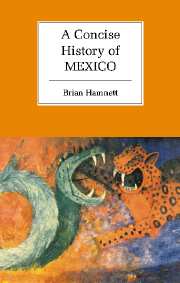Book contents
- Frontmatter
- Contents
- List of illustrations
- Preface
- 1 Mexico in perspective
- 2 The pre-Columbian era
- 3 The European incursion, 1519–1620
- 4 New Spain, 1620–1770: Spanish colonialism and American society
- 5 Destabilisation and fragmentation, 1770–1867
- 6 Reconstruction, 1867–1940
- 7 The monopoly party, 1940–2000
- Final comments
- Bibliography
- Index
2 - The pre-Columbian era
Published online by Cambridge University Press: 05 June 2012
- Frontmatter
- Contents
- List of illustrations
- Preface
- 1 Mexico in perspective
- 2 The pre-Columbian era
- 3 The European incursion, 1519–1620
- 4 New Spain, 1620–1770: Spanish colonialism and American society
- 5 Destabilisation and fragmentation, 1770–1867
- 6 Reconstruction, 1867–1940
- 7 The monopoly party, 1940–2000
- Final comments
- Bibliography
- Index
Summary
Controversy accompanies discussion of the earliest inhabitants of the Americas. The peoples referred to by Europeans as ‘Indians’, who appear to have crossed from Asia some 12,000 years ago, may not have arrived first. With the extinction of the hunted mastodons around 8000 BC, seed for food crops and the domestication of animals began. The cultivation of maize developed in the Valleys of Tehuacán and Oaxaca between 8000 and 5000 BC. In relative terms, this would compare with the cultivation of wheat in Syria and Mesopotamia around 9000 BC and 8000 BC, respectively, and the development of barley in the Indus Valley around 7000 BC. In this increasing reliance on plant food, women played the crucial role of cultivators. During the Meso-American Archaic Period (7000–1500 BC), village farming and networks of exchange over distance emerged. By 3000–2000 BC, settled villages, cultivating maize and other cereals and making pottery, had appeared over large areas of Mesoamerica.
THE OLMECS
There is an ongoing debate concerning whether Olmec culture, which flourished between 1200 and 300 BC in the tropical lowlands of the Gulf of Mexico, represented the base from which later cultures developed in different geographical directions, or whether it was simply a culture parallel to others which flourished contemporaneously.
- Type
- Chapter
- Information
- A Concise History of Mexico , pp. 24 - 57Publisher: Cambridge University PressPrint publication year: 1999

